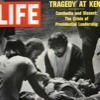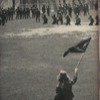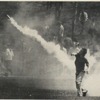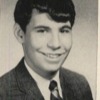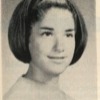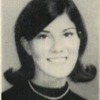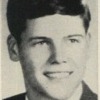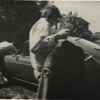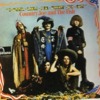

If you see this message, that means that you either do not have the latest version of Adobe Flashplayer installed (install it here) or you have blocked the ActiveX control for Internet Explorer. Please reload the page and allow the control.
 |
 |
 |
| Mr. Birkner: 1960's | ||
| Mr. Birkner describes the Kent State incident with the National Guard. |
Mr. Birkner was not a Vietnam War veteran or a member of the armed
services during the war. He was in high school when the war was coming
to a climax. His sister, who was also interviewed was a freshman in Kent
State when the protest had occurred. Mr. Birkner himself was in town as
a high school junior - the same age as our interviewees - when it had
all happened. This interview with Mr. Birkner tells us how and what the
general reaction of the town’s people was when Kent State happened.
His observations show the division in opinions among the American public.
Q: Can you state your name please?
Mr. Birkner: My name is David Birkner
Q: When were you born?
Mr. Birkner: December 1st, 1952
Q: Could you describe where you grew up? What was your childhood was like? And was your father in world war II?
Mr. Birkner: I grew up in Kent Ohio, that’s where Kent State University is, and I was actually born in California but moved when I was 2 years old, so I don’t really remember that. Growing up in Kent, was, Kent is a small town, when Kent state happened, it was about 20,000 it’s kind of different now, but when we first moved there I think it was less than that. So, it’s kind of a small town. I went to public schools in Kent. It was a town where a lot of people stayed there a long time. That is where actually my father grew up, and one of my teachers, my kindergarten teacher, was my father’s kindergarten teacher, and he was born in 1917 when it was World War I, and that was a long time ago. My father was not in World War II. He wore eye-glasses and back then, unless you had perfect vision, they wouldn’t draft you; and he had a defensive job and he built airplanes; Fighter planes. So, he got drafted at the end of the war, but that was right at the end of the war, so he didn’t have to go into the army.
Q: As a teenager how aware were you of the world events?
Mr. Birkner: Well I was certainly as I got, you know, along in high school, when I was your age, the world was in full swing, and the moment I turned 18, I would be subject to draft, to be drafted; and at that time, they were actually taking quite a few of the people who were eligible when they turned 18. There was a lottery; you got a lottery number and depending where you lottery number was, between 1 and 365, and they would draft a certain number, you know, up to a certain number each year. And, so, I did start to worry about a few things. I had two cousins from the town, who were - one was a marine and one was in the army - in Vietnam, and I was concerned about them. And so, I was kind of following what was happening because it was getting personal.
Q: Were your cousins drafted? Or did they actually volunteer?
Mr. Birkner: One of them volunteered, the marine, he was about 4 years older 4 or 5 years older. He had gone to a military academy because he grew up without a father so his mom sent him into a military academy to teach how to be a man, so he joined the marines when he graduated. And my other cousin, actually he also joined, he was about two years older than me and he joined the army.
Q: What would you recall the general state of the country as you came of age?
Mr. Birkner: Well, I remember a lot about music because in high school I played music a lot, so I enjoyed that. There was good rock and roll back then we still listen to today; the Beatles, and the Doors and all kinds of bands, and you know But, I was also living in a college town; because the town was about 20,000 people and the university was about 20,000 people. So it was really, kind of half and half which was one of the things contributed to the towns people and they were kind of upset and scared. You know, there was a big university in a small town. There was a lot of students there to do damage, which they did, in terms of breaking up the place a little bit. But because it was a college town, I was kind of aware of the concerns about, you know, what they were concerned about. There have been other previous demonstrations in town about the war during the years, in town, in the university, in the campus. So this was kind of the last one.
Q: When did you first hear about the conflict in Vietnam? And did you worry about how it might impact your future?
Mr. Birkner: I guess, I guess since my cousins were in the army there, I must have heard about it. And… I’m trying to think. Probably in the mid -60s, you know, before that, I’m pretty sure I knew about the war but it didn’t become personal until your family starts getting involved, and getting worried about being drafted.
Q: How old were you when the war generally started?
Mr. Birkner: Well, I was 17; I was exactly your age on May 4th, 1970. And so, the war actually started in the 60s. I think it was really getting into full swing kind of in the mid 60s, So I was about 12 to 17.
Q: What was the general opinion about the war in Kent, Ohio before the major protest?
Mr. Birkner: I think that the major opinion, of most of the town’s people, they were for the war. Your country right or wrong was sort of the attitude in Kent and of course the student population was opposite of that: Against the war.
Q: Including you?
Mr. Birkner: Well, remember having two cousins in the armed services, and my father at the time worked in the military defense plan. I had two uncles who had been in world war II, and I liked to play army when I was a little kid. You know, I was tempted to be, I think, for the country, but like I said, when I got closer to me maybe getting drafted, as the war seemed to be dragging along a long time, and as I got older, and started identifying myself as a college student, because I actually started college the next year: the fall of 1970. The time it happened, I actually applied early to start college, so I really was starting to identifying myself with them. So I was really kind of torn with, between you know, “gee its for the country, and they must know what they’re doing,” But also “gee, this war really is a bad thing, and I might have to be in it”. I was just torn.
Q: Would you say most towns other than Kent were for the war?
Mr. Birkner: I think that most college campuses were pretty much against the war, and larger cities and more liberal states, like Massachusetts, were [I think] probably against the war, and mid west - Ohio was mid west - I think most people were for the war; that’s one of the reasons I think Kent Sate happened.
Q: You said there were other protests in Kent before this one?
Mr. Birkner: Yeah the year before around the same time, there had been similar protests. They have had no guards though. At one point, students took over one of the buildings on campus. They took over one of the buildings - I think it was the library - they had a sit in and a demonstration. It took a while for them to get out of there - it took police to get them out of there, so people were a little sensitive about the demonstrations.
Q: So what was your initial reaction after Kent state happened? Did anything change for you?
Mr. Birkner: Well, let’s see. So, the first thing that happened to me, May 4th was a Monday, so the first thing that happened to me was on the Saturday. I was a musician I mentioned, played in a band, and we had a job on Saturday night and we came back into town around midnight after playing, and we pulled into the driveway of our drummer, whose house was right across from the campus, and we pulled in our van and because we were in a van, we had long hair, and we opened and started taking stuff out of the van, and a jeep pulled over with four national guards with rifles pulled in and said “stop!” because they thought we were outside agitators. Coming in, and bringing in god knows what. So that was the first time I became really aware there was trouble. I was out of town that night, and that night was when they burned down the ROTC building. So, the next day it was kind of calm, and on Monday, we were a little worried, but we still went to school; I went to high school that day. And sometime a little after lunch, helicopters starting flying over, which was very unusual. And you know, there were some rumors. There was some bad stuff was going on, and the principal got on the loud speaker and said that we all had to go home. And you know, this was before the school day was over. And then, I can’t remember weather this was on the loud speaker, or weather he said personally to me, but he said that that national guards have been shot.
Q: He said that?
Mr. Birkner: Yeah, he said that. So at that point I was very worried and I was very upset to the students that they would do something like that and hurt the innocent soldiers. And they were there as a policemen in Kent; and when I got home, we had a newspaper, that came out in the afternoon that got delivered around 3 o clock in the afternoon so they got the press around a little earlier than that; and the front page of the newspaper had said that the national guards have been shot.
Q: The guards? Not like the students?
Mr. Birkner: Yeah. So yeah, of course I was upset when I saw that and think about it. I lived a little ways out of town, but the people in the town who all got this newspaper, you know, you couldn’t go on campus because it was closed and stuff. So for a while I thought the students were killing national guardsmen, so it was very upsetting. And, a lot of the townspeople were sitting out in the porch with the shotguns waiting for the students to run up and try and come in and onto their property, because students have rioted and broken windows in the town [I think] on Saturday night. So, the people were awful. Then of course the national news came out and it said that 4 students have been shot and of course it was a little bit more accurate. At that point I was horrified and worried because my sister was a student in campus, and I knew she was up there and I knew she was concerned about things, and political. I don’t know what she told you, but I was very worried about her; and I think we had school the next day. I can’t really remember, but the place was really somber, it was kind of, you know, couldn’t believe it. I also remember, I don’t actually remember when, but walking around after that you know, I was around your age, so I could easily be mistaken as a college student. I had a hair about your length, and so I looked like a hippy and I had townspeople you know, looking at me like they wanted to kill me. So I was just like “ahh”, you know just “ahh”.
Q: Did you feel intimidated at all?
Mr. Birkner: I felt very intimidated. And the whole thing had an effect on me about how I thought of the state of Ohio after all that, and the thing started to come out about how the governor sent these guards who had real bullets and stuff.
Q: Did you talk to your sister soon after it happened?
Mr. Birkner: Not right after it happened because it was so crazy. And she lived on campus and she didn’t live at home. So I didn’t talked to her right away. But I knew she was okay. She called mom and told her she was okay later.
Q: When the National Guard came on Saturday night, did you feel scared about the whole situation? What did you feel like?
Mr. Birkner: Well, I was a little startled when they confronted me. But they also, like I said I was torn between feelings. Like I said the students had marched Main Street of the town and broken bunch of windows. It was all part of the protest and the fact that they tried to hold their protest. And the police kept breaking them up and said couldn’t assemble. And you know, we sort of have the freedom of speech and things like that so they were sort of mad. We never knew if it was political people who were doing this, or just it was drunk people who thought it was a great chance to come and break windows.
Q: How did the people in the community to react to the protest?
Mr. Birkner: Very negatively. The general feeling was that the students were a bunch of hippies, they should’ve shot more of. That was the common feeling.
Q: So there was a lot of anger?
Mr. Birkner: Yes, yes.
Q: How did you, yourself feel about the protest?
Mr. Birkner: I felt that they shouldn’t have burned down the ROTC building, they shouldn’t have marched around breaking windows, there was nothing that Kent did that made the war go on. They shouldn’t have burned a building - I thought that was unlawful. So I was mad at that, but, nothing they did in any way would justify with anybody being shot at that. So it was hard. I was totally torn. They shouldn’t have done what they did, but they shouldn’t have been shot with you know, guns. They were trying to protest the war. By 1970, you know, it was going on a long time, and people were dying.
Q: Were you friends in high school torn apart like you were? Or were they really against it? Or would you say they would love to actively participate in the war?
Mr. Birkner: I think it was probably more of the opposite. They were probably more against the students and more pro-football team. I actually had some friends who were high school, they were friends who were, who lost people. I was in the middle. I had friends who were out there, but I also had friends who were you know, normal. With short hair.
Q: After the Kent state protest, did your view in war change?
Mr. Birkner: Because I became so much more aware of, I think I probably didn’t know what was really going on. I didn’t want to go to Vietnam. It looked like a really scary place. One of the kid on my street got drafted who was couple years older than me and got killed shortly after he got there. And my cousin who was in the marines, and my other cousin who was in the army were over there while I was in college, so there was that. So, I was deeply very affected about the war. Especially after that.
Q: How did you feel about getting a lottery number?
Mr. Birkner: I had to register for the draft; and they gave you the [draft] number. I got the number 38, which meant, Yeah, so I had to make sure I stayed in college. As long as I stayed in college, kept my grades up, I got a deferment. As long as I did that, I wouldn’t need to get drafted. They couldn’t draft you while you were still in high school. The year I started college they were still giving out college deferments. So as long as I stayed in college, I wouldn’t get drafted until I graduated for some reason. So it was always on my mind. It made me study hard.
Q: So did it scare you?
Mr. Birkner: It did. Just because by the time I was in college, I didn’t really know what the situation was. It turns out by the time I graduated, thankfully, things had settled down.
Q: Would you say you were more aware of the war after the kent state?
Mr. Birkner: Very much so. Because at first, a lot of the people were saying they should’ve killed more of them, but when things started to come out, people realized that the war was horrible. A lot of people changed their thoughts about war. I was also starting to be very concerned about that.
Q: I think that’s all, thank you very much for your time. Just one more thing, Would you say that the situation in Iraq right now is similar to the situation in Vietnam?
Mr. Birkner: I don’t know what to say. But it’s getting there, it’s getting very close.
